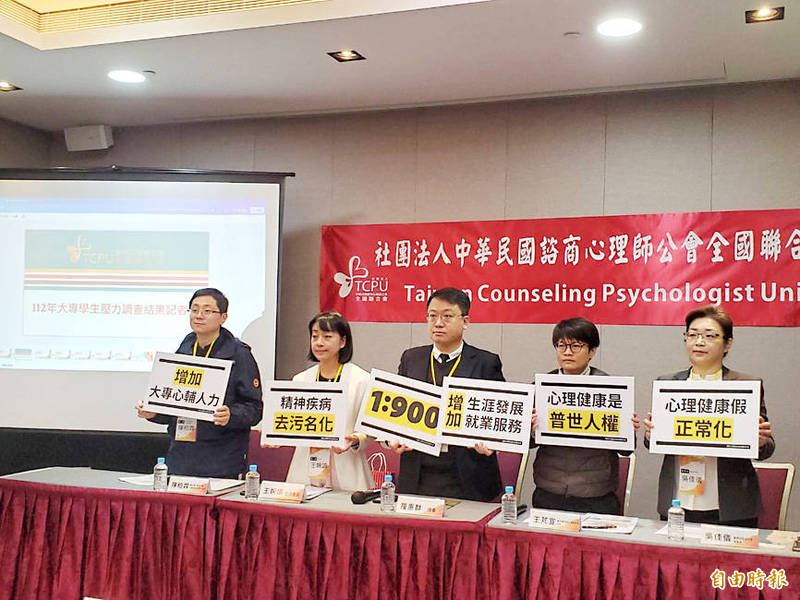《TAIPEI TIMES》 More than 25% of university students depressive: survey

Members of the Taiwan Counseling Psychologist Union holds a news conference in Taipei on Monday. Photo: Lin Hui-chin, Taipei Times
PANDEMIC IMPACT: Experts called for more mental health resources on university campuses and lowering the counselor-to-student ratio to improve well-being
/ Staff writer, with CNA
More than a quarter of domestic university students showed moderate to severe depressive tendencies this year, according to a survey released by the Taiwan Counseling Psychologist Union on Monday.
Chen Po-lin (陳柏霖), an academic in National Taipei University of Education’s Department of Psychology and Counseling, told a news conference that 25.5 percent of students surveyed showed moderate to serious depressive tendencies — almost 10 points higher than pre-COVID-19 levels.
Chen said that in the final survey before the onset of the pandemic in early 2020, 16.3 percent of respondents showed depressive tendencies.
Union member Hu Yen-wei (胡延薇) said that the impact of the pandemic on Taiwanese university students has been far greater than they first thought, with those in their junior year being most profoundly affected in terms of studies, relationships and hopes for the future.
Chen said that before the COVID-19 pandemic, the majority of domestic university students felt a moderate level of happiness and depression, followed by those who sensed a high level of happiness with low depression and those who had a moderate sense of happiness with low depression.
However, the first group remained the majority among university students this year, followed by increasing numbers of students who have a low sense of happiness with high depression and a low sense of happiness with a moderate level of depression in second and third respectively, Chen added.
Chen called for greater attention to university students’ mental health, including providing more access to counseling as well as regular monitoring and evaluation of individuals.
Many seemingly well-adjusted third-year university students are highly concerned about an array of challenges, including juggling coursework and relationships, as well as anxiety regarding time management and career development, Hu said.
Echoing Chen, Taiwan Association Against Depression chairperson Wu Chia-yi (吳佳儀) called for mental health resources to be better funded on university campuses, expressing hope that the average counselor-to-student caseload ratio could be lowered to one to 900 from one to 1,200.
Ministry of Health and Welfare official Wang Peng-hsuan (王芃宣) said those aged 15 to 30 were entitled to three free counseling sessions as part of a service launched on Aug. 1.
As of the end of last month, more than 14,000 people had sought such mental health counseling, with 30 percent of them in the high-risk group who need adequate medical assistance, Wang said.
The Taiwan Counseling Psychologist Union survey was conducted from Nov. 4 to Dec. 1 and collected 1,635 valid samples.
新聞來源:TAIPEI TIMES
















